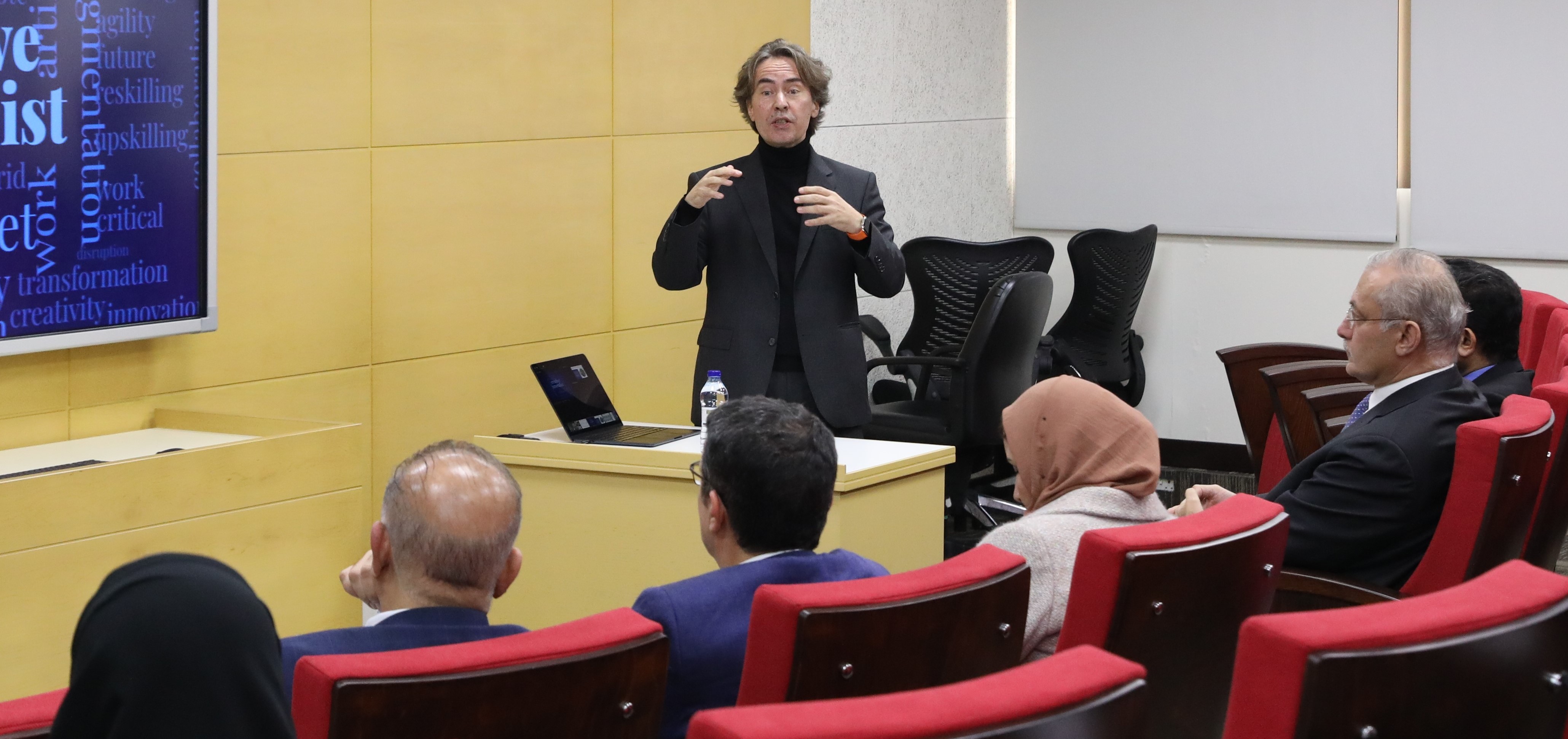
Shaikh Isa bin Salman Al Khalifa Chair for Technology Management Hosts Dr Erik Wende to Discuss Digital Leadership Amid Institutional Transformation and Emerging Technologies
Arabian Gulf University
26 Jan, 2025
The Shaikh Isa bin Salman Al Khalifa Chair for Technology Management at the College of Education, Administrative and Technical Sciences of the Arabian Gulf University (AGU), recently hosted Dr. Erik Wende, who delivered a lecture on “Digital Leadership in the Context of Institutional Transformation and Emerging Technologies”.
During the lecture, Dr Wende highlighted key moments from his professional experience at the University of Leipzig in Germany, as well as his practical expertise in the fields of informatics and digital leadership. The event came as part of the initiative launched by His Excellency Dr Saad bin Saud Al Fuhaid, President of the Arabian Gulf University, to activate the scientific chairs within the university’s colleges.
Dr Wende presented the model of the Digital Mindset, which encompasses systematic thinking and generalisation linked to people’s needs and data, while promoting principles of sustainability and resilience. He emphasised the significance of digital transformation within a knowledge society, which is rooted in continuous learning, experimentation, adaptation and the use of technology, alongside participation and collaborative research across various knowledge areas.
He pointed out the importance of digital leadership and its impact on tackling contemporary challenges, stating: “What distinguishes digital leadership is the creator’s ability to integrate multiple fields to develop innovative business models in the face of uncertainty and complexity within socio-economic and environmental policies.”
Dr Wende also stressed the necessity of developing higher education institutions to enhance critical thinking and the use of technology in order to provide innovative solutions. He clarified that a digital leader must possess the capability to integrate a diverse set of skills and knowledge, while harnessing emerging technologies such as Artificial Intelligence, which is pivotal in advancing innovative business models.
Moreover, Dr Wende articulated that higher education should be at the heart of these efforts, as it must foster critical thinking, analytical skills, and innovation among graduate students, empowering them to utilise technology as an essential part of their thinking process to develop practical solutions for economic, social, and environmental challenges.
In turn, Prof. Waleed Zubari, Dean of the College of Education, Administrative and Technical Sciences and Professor of Water Resources at AGU, noted that investment in scientific chairs represents a strategic step towards a brighter future for both universities and communities. He explained that these chairs provide opportunities for sustainable innovation and ongoing academic growth, reiterating the importance of enhancing this academic model at the university and striving to create a fertile scientific environment that supports critical and creative thinking across various disciplines.
For her part, Dr Afaf Bugawa, Director of the Shaikh Isa bin Salman Al Khalifa Chair for Technology Management, affirmed that the strategic objective of the chair is to enhance academic and research excellence in the field of technology management through the development of innovative knowledge, fostering sustainable partnerships with local and international entities, and preparing human resources capable of effectively leading digital transformation and managing modern technologies to achieve sustainable development.
In this context, she stated: “The establishment of the chair is a significant step towards realising the university’s ambitious vision of becoming a global hub for technological creativity and knowledge management. Through its strategic objectives, the chair aspires to be a pioneering model that positions the university at the forefront of leading technological advancements to serve the developmental priorities of the GCC countries.”
In a related discussion, Prof. Odeh Aljayyousi, Head of the Department of Innovation and Technology Management, explored several topics related to the lecture, such as addressing the relationship between humans and technology in the digital age, mechanisms for developing teaching methodologies that foster critical thinking and empathy in the era of Artificial Intelligence, as well as exploring whether digital leadership is considered a form of transformational or organic leadership, and ways to prepare future generations for new professions, in addition to enhancing research collaboration between universities.
